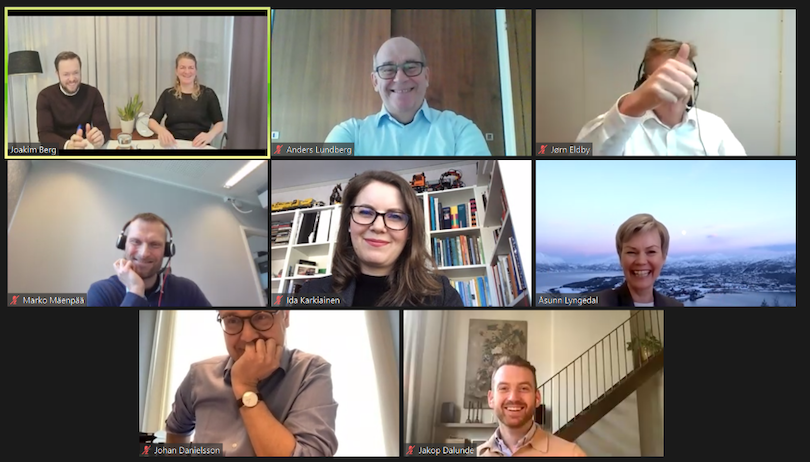The extension of the European core network corridors from a Nordic perspective

The 26th of February, North Sweden European Office, together with Norrbotten Chamber of Commerce, the Bothnian Corridor and Buisiness Oulo, arranged the digital webinar “European core network corridors going global”, a webinar on the extension of the European core network corridor. The purpose of the webinar was to offer new knowledge about the European core network corridor from a Nordic perspective.
The European core network is extending, and the global infrastructure is expanding, this means new opportunities for northern Europe, but also new challenges. With a focus on the extension of the European core network, North Sweden European Office, together with Norrbotten Chamber of Commerce, the Bothnian Corridor, and Business Oulo, arranged the digital webinar on the 26th of February. The webinar addressed issues like how the extension of the core network corridor will affect the flow of goods, and what needs to be done to ensure cost-effectiveness and reliability in the transport corridors. The webinar included speakers like Vera Kissler, advisor to European Coordinator for the TEN-T North Sea-Baltic Corridor, Johan Danielsson and Jakop Dalunde, members of the European Parliament, and representatives from both regional and national level from Sweden, Norway, and Finland.
The extension of the core network corridors in northern Europe and the opportunities for northern Sweden
Vera Kissler, advisor to European Coordinator for the TEN-T North Sea-Baltic Corridor, presented the view of the European Commission on the extension of the core network corridor in northern Europe within the Trans-European Transport Network, TEN-T. Kissler stated that the corridors are important tools for linking the European transportation system and described how the extension will promote trade via rail and shipping. According to Kissler, the transition to new modes of transport was also expressed as increasingly important for the green transition.
Johan Danielsson, Member of the European Parliament, discussed how the natural resources and the widespread forest industry of northern Sweden both promote innovation and create jobs. He also discussed the long distances and the sparsely populated areas of the region. To be able to take advantage of the opportunities of the north, it is therefore increasingly important to have good transport opportunities that connect northern Sweden with the rest of Europe, which in turn will improve the competitive opportunities of the region. He emphasized the importance of the European green deal, and that the transportation sector plays an important role in the green transition. He also drew attention to cross-border transportation and the importance of having a system that enables transportation across national borders.
Jakop Dalunde, Member of the European Parliament, talked about the recovery, both during and after the Covid-19 pandemic, and stressed how important it is that the transport sector doesn’t return to its old patterns when the pandemic is over. He also mentioned that the decisions regarding the transport sector are often made on a central level, which according to Dalunde, means that the decisions do not always meet the regional needs.
Regional perspectives of the extension of the European core network corridors
Mirja Vehkaperä, Chairman of the City Board of Oulo & Member of the European Committee of the Regions, talked about the importance of the cross-border transportation for northern Finland where the transport links are very important for the development of the region and for the region to be able to compete with other European countries. Jørn Eldby, General Manager, BA-Center North at UiT, The Arctic University of Norway, stressed the importance of good infrastructure for business development in the northern regions. He talked about Norway, which is a major exporter of seafood, and therefore has a great need for increased train capacity. He also expressed that it is paramount that transportation occurs via railway instead of roads if the transport sector keeps up with the green transition.
Read more about the webinar here.
/ Matilda Albertsson
